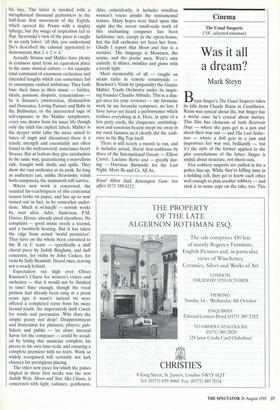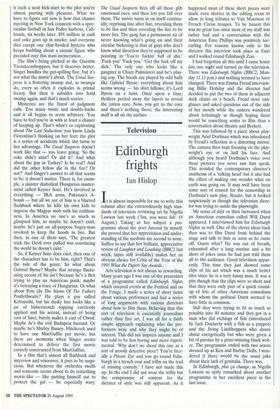Cinema
The Usual Suspects ('18', selected cinemas)
Was it all a dream?
Mark Steyn
Bryan Singer's The Usual Suspects takes its title from Claude Rains in Casablanca. Rains was cynical about life, but Singer has a worse case: he's cynical about movies. This film has elements of both Reservoir Dogs — where the guys get in a jam and shoot their way out — and The Last Seduc- tion — where a doll gets in a jam and improvises her way out, brilliantly — but it's the style of the former applied to the plot convolutions of the latter: Singer is stylish about structure, not shoot-outs.
Five robbery suspects are pulled in for a police line-up. While they're killing time in a holding cell, they get to know each other well enough to plan another robbery — and stick it to some cops on the take, too. This is such a neat kick-start to the plot you're almost purring with pleasure. What we have to figure out now is how that chance meeting in New York connects with a spec- tacular fireball in San Pedro harbour, Cali- fornia, six weeks later. $91 million in cash and coke goes up in smoke; and everyone dies except one char-broiled hysteric who keeps burbling about a satanic figure who presided over this mass incineration.
The film's being pitched at the Quentin Taranteenyboppers, but it deserves better. Singer handles the gut-spilling fine, but it's not what the movie's about. The Usual Sus- pects is a festering swamp and, as swamps do, every so often it explodes in primal frenzy. But then it subsides into fetid swamp again, and that's much scarier.
Mysteries are the finest of judgment calls. Too many twists and double-backs and it all begins to seem arbitrary. You have to feel you're in with at least a chance of keeping up. That's what's so captivating about The Last Seduction: you know Linda Fiorentino's thinking on her feet; the plot is a series of accidents which she turns to her advantage. The Usual Suspects doesn't work like that — you leave going, 'So the coke didn't exist? Or did it? And what about the guy in Turkey? Is he real? And did the other fellow die in the fire? Or not?' And Singer's answer to all that seems to be: it doesn't matter. There is, for exam- ple, a sinister diabolical Hungarian master- mind called Keyser Soze. He's involved in everything — IRA arms, Pakistan's A- bomb — but all we see of him is a blurred flashback where he kills his own kids to impress the Magyar mob with his ruthless- ness. In America no one's so much as glimpsed him, so maybe he doesn't exist, maybe he's just an all-purpose bogey-man invoked to keep the hoods in line. But then, as one of them says, 'The greatest trick the Devil ever pulled was convincing the world he doesn't exist.'
So, if Keyser Soze does exist, then one of the characters has to be him, right? That's the rule of the genre. So what about Gabriel Byrne? Maybe that strange fluctu- ating accent of his isn't because he's a Brit trying to play an American punk; maybe it's betraying a trace of Hungarian. Or what about Pete (In The Name Of The Father) Postlethwaite? He plays a guy called Kobayashi, but his dusky hue looks like a jar of butterscotch topping carelessly applied and his accent, instead of being east of Suez, barely makes it east of Clwyd. Maybe he's the evil Budapest bastard. Or maybe he's Shirley Bassey. Hitchcock used to have one MacGuffin per movie, but there are moments when Singer seems determined to deliver the first movie entirely constructed from MacGuffins.
In a film that's almost all flashback and interview and voiceover, it pays to be suspi- cious. But whenever the orchestra swells and someone seems about to do something movie-like — like putting himself out to protect the gal — be especially wary: The Usual Suspects fires off all those glib emotional cues, and then lets you fall over them. The movie turns in on itself continu- ally, reprising line after line, revealing them to be lies and then revealing the lies to be more lies. The gang has a permanent air of never knowing what's going on and their circular bickering is that of guys who don't know what direction they're supposed to be pointing in: 'You're fuckin' full of shit.' 'Fuck you' Fuck you.' Get the fuck off my dick.' The only one who looks like a gangster is Chazz Palminteri and he's play- ing cop. The hoods are played by odd balls like Gabriel Byrne: everything about him seems wrong — his shirt billows; it's Lord Byron on a heist. Once upon a time, thrillers peeled away the layers to reveal the rotten core. Now, you get to the core and there's nothing there; the interesting stuff is all on the surface.



















































 Previous page
Previous page